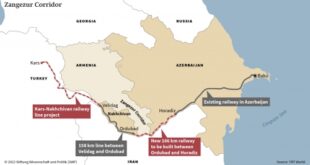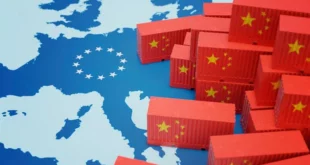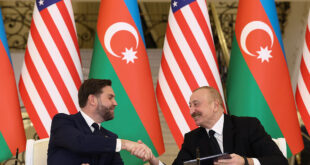At the July G8 Summit the Kremlin is going to present its “particular initiative of energy security”. It refers to a proposal to create a vast Russian-German-Italian gas corporate group which will help Moscow to establish a “new order” in Europe. On the other hand, Russia hopes to finally bury the Polish idea of creating an “Energy NATO”. The US reaction to such a demarche can be a breakdown of the G8… ![]()
 According to the information simultaneously received from sources in Warsaw and Bucharest, Moscow plans to spring a big surprise on its partners in the G8, and most of all – on the USA. In the course of the upcoming summit of this organization in Saint Petersburg, in July, the Russians are going to voice their new strategic initiative in the sphere of collective energy security in Europe. This initiative is based on the proposal to create a giant Russian-German-Italian gas concern. The same sources claim that the Kremlin decided to leave France aside, as the latter has weakened in the last years due to a whole series of internal political and social problems. Meanwhile, the Russians already have quite tight ties in the energy sphere with their potential partners. It is enough to recall the Russian-German “project of a century” – construction of the North European gas pipeline on the Baltic seafloor, or the rapid seizure by the Russian gas giant Gazprom of the Italian energy market. If the new Russian initiative seems too expansive to Berlin and Rome, Moscow will be ready to finance the first stage of its realization. According to the same sources, creation of an international gas corporate group is only a first step in a much broader plan of establishing a “new order” in Europe, under the aegis of Russia. According to the Kremlin, the main preconditions needed for realization of this plan are already present.
Â
There are two of these preconditions: self-discrediting of the initial idea that lies in the basis of the European Union; speedy sinking of the US credibility and influence in the world, and particularly in Europe. In such situation the Russian initiative, as its authors assume, can become a sort of the European Coal and Steel Community (ECSC) (1951), which was in the focus of the EU formation. Only this time the dominant role in new Europe will be played by Russia, the main energy resources’ supplier. Officials in the Kremlin are convinced that the deeper Washington sinks in problematic regions of the world (like Iraq and Iran), the easier will be the task of breaking down the American resistance to the Russian initiative. According to Putin’s and his entourage’s estimation, at the and Washington will be constrained to leave Europe alone, in order to cope with the growing social and interethnic conflicts at home. If this happens, the Polish initiative to create a sort of an “Energy NATO” independently from Russia, as well as all other ideas of that kind, will be buried forever. Left without a real patron, Poland, Latvia, Romania, Bulgaria and other Central and East European countries will be bound to fall into line with Moscow. Therefore, the Kremlin sees no need to waste time on settling the controversial issues with these countries at the moment.
 In this connection, the author of this article was told that Washington is well aware of Moscow’s far-reaching plans of an energy seizure of Europe. And this awareness lies in the basis of some prominent Republicans’ demands to boycott the G8 summit in Russia. Regardless of President Bush’s aspiration for a dialogue with the Russians, as well as his declared will to arrive in Saint Petersburg, at the end of the day the disputes over Russia’s energy policy may lead not only to a crisis in its relations with the USA, but to a whole breakdown of the G8. Today, there is an opinion in the European diplomatic circles, according to which the G8 forum is already irrelevant, and will soon cease to exist, at least in its present composition (with Russia inside).
Â
It is worth reminding that the abovementioned information was received from the East European diplomatic sources, i.e. from the side which is all but neutral in this particular issue. Therefore, one should treat this information with all relevant prudence, at least at this stage. However, there is no doubt that the opinion of the Polish and Romanian diplomats deserves some attention.
 According to official information, the G8 summit will be held in July 2006, in Saint Petersburg. The decision to hold the summit in Russia was made due to the fact that since January 1, 2006, this country heads the organization. The Russians promise to include in summit’s agenda a number of initiatives in the sphere of energy and antiterrorist security, as well as such issues as development of the nuclear energy sphere, demography, and healthcare. In President Putin’s opinion, the initiatives on a “sustainable supply of the world economy with traditional types of fuel” are the most important. On the other hand, representatives of the Russian political establishment on several occasions told the mass media that their country won’t endure any attempt to decide on the global energy issues behind its back. In this context, the Polish initiative to create an “Energy NATO” was most severely criticized. A covert threat that was recently voiced by the Russian President at the press conference in Prague, when he mentioned possible diversification of the Russian energy resources in reply to the Polish initiative, was practically incarnated during Putin’s further visit to China, where he signed the agreement on annual supplies of some 80 billion cubic meters of Russian gas to China.
 Russian mass media unequivocally called this document a response to the so-called “Green Paper” of the European Commission that was published at the beginning of March, and contained a proposal on diversification of the EU energy sources and reducing their purchase outside the Union. Moscow’s next step will obviously be the publication of the Russian energy proposals to the G8, absolutely contradictory to proposals written in the “Green Paper”. It is known from the words of the Russian Deputy Minister of Foreign Affairs Alexander Yakovenko that these proposals are already prepared for publication. However, as the President Putin himself told during his meeting with the G8 Energy Ministers, till July these proposals won’t be publicized. The abovementioned information of the East European diplomatic sources is obviously an attempt to remove the veil from the upcoming Russian initiative in the energy sphere.
 Eurasia Press & News
Eurasia Press & News



